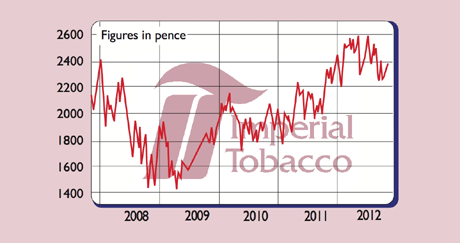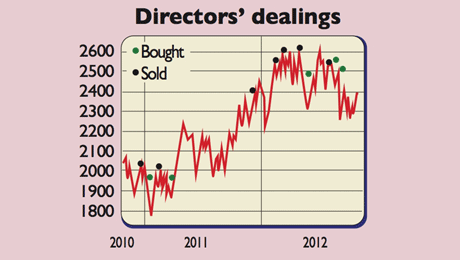Shares in focus: A tobacco giant in rude health
Imperial Tobacco’s dividends have risen by 75% over the past five years. Is there more to come, and should you buy the shares? Phil Oakley investigates.
Get the latest financial news, insights and expert analysis from our award-winning MoneyWeek team, to help you understand what really matters when it comes to your finances.
You are now subscribed
Your newsletter sign-up was successful
Want to add more newsletters?

Twice daily
MoneyWeek
Get the latest financial news, insights and expert analysis from our award-winning MoneyWeek team, to help you understand what really matters when it comes to your finances.

Four times a week
Look After My Bills
Sign up to our free money-saving newsletter, filled with the latest news and expert advice to help you find the best tips and deals for managing your bills. Start saving today!
Imperial Tobacco's dividends have risen by 75% over the past five years, and there's more to come the shares are a buy, says Phil Oakley.
The business
Imperial Tobacco is an international tobacco company famous for cigarette brands such as Davidoff, Gauloises, West and John Player Special. The company is the world leader in fine-cut tobacco (Drum and Golden Virginia) and cigarette rolling papers (Rizla).
It owns a 50% stake in Habanos, which has the exclusive global distribution rights of premium Cuban cigars, such as Cohiba and Montecristo. Imperial also makes a smokeless tobacco product called Snus, which is very popular in Scandinavia. The company had sales of just over £7bn in the year to September 2012.
MoneyWeek
Subscribe to MoneyWeek today and get your first six magazine issues absolutely FREE

Sign up to Money Morning
Don't miss the latest investment and personal finances news, market analysis, plus money-saving tips with our free twice-daily newsletter
Don't miss the latest investment and personal finances news, market analysis, plus money-saving tips with our free twice-daily newsletter
The history
The Imperial Tobacco Company Limited was formed in 1901. It came into being when 13 family tobacco businesses got together to fend off the American Tobacco Company it wanted to buy all of them and corner the British market, and had set aside $30m to do so, a huge sum at the time.
The two companies fought each other for a while before agreeing to stay off each other's patch. Imperial then spent the first half of the 20th century buying other businesses.
As well as other tobacco companies, it bought chains of tobacco shops and wholesalers and began making cigarette papers. The 1960s saw Imperial turn itself into a conglomerate, buying food and manufacturing businesses to diversify away from the tobacco business.
It started this process by buying potato crisp maker Golden Wonder, but went on to buy HP Sauce, the National Canning Company and Ross Frozen Foods before the decade was out.
The purchases continued into the 1970s with British breweries and pubs group Courage and Pillsbury Foods in America. Then, in 1985, Imperial itself was taken over by Hanson Trust for £2.5bn. Hanson sold off all Imperial's other businesses for nearly the same amount, leaving it with a profitable tobacco business for next to nothing. In 1996, Hanson decided to list Imperial Tobacco on the stock exchange.
Now a separate company again, Imperial went on a spending spree over the next decade, making itself one of the world's biggest tobacco companies. Shares in Imperial have been a good investment. During the last five years a focus on key brands and cost cutting has seen dividends increase by 75%.
The chief executive
Alison Cooper will soon be one of only two women to currently run a FTSE 100 company Burberry's Angela Ahrendts is the other. Starting out as an accountant with PricewaterhouseCoopers, she joined Imperial Tobacco in 1999 and became group financial controller two years later.
She then rapidly climbed the company ladder with a number of prominent operational roles before becoming chief executive in 2010. She is also a non-executive director at car retailer and distributor Inchcape.
Despite her rarity value as a female CEO, Cooper is not a supporter of female quotas for company boards, believing that women should only be there if they are good enough. Apparently partial to one of her company's cigars now and again, she was paid £1.9m last year.
Should you buy the shares?
Ethical considerations mean that investing in tobacco companies isn't for everyone. But from a purely financial perspective these shares can make a great addition to your retirement fund.
Tobacco companies are constantly fighting many battles. Governments keep raising taxes on smoking and making it more difficult for these firms to sell their products. The rising cost of smoking means that consumers are keeping their hands in their pockets more often or buying cigarettes on the black market. The value of Imperial's Spanish business has been written down by £1.2bn to reflect this post-financial-crisis reality.
Nonetheless, despite all these difficulties, the company's profits keep growing and shareholders' dividends keep rising. That's because Imperial's long-term strategy is paying off. Sales of its key cigarette brands are growing nicely and people are prepared to pay more for them. Sales of fine-cut tobacco and premium cigars are also doing well.
Despite more people buying cigarettes in illegal markets, Imperial's Drum and Golden Virginia tobaccos, combined with Rizla papers, mean that smokers can also save money by rolling their own. Failing that, the company also has a good selection of value cigarette brands for people to trade down to.
Imperial is not only growing its sales, but is also taking out costs. This means that profits can keep growing while the returns on its assets should still be more than respectable.
Debt levels are a little bit higher than some of its peers, which has worried some analysts. However, we are quite relaxed. Paying the interest bill is no problem as the company continues to generate lots of cash (this is illustrated by the high level of interest cover, as noted below).
Imperial's shares look very good value at the moment, trading on just over 11 times next year's profits, while offering a dividend yield of nearly 5%. With the company paying out a little over half its profits to shareholders, we think that dividends can keep growing for a while yet. This makes the shares a good long-term income investment.
By holding for the long-term and reinvesting the large dividend payments in more shares, buying Imperial today could mount up to a tidy sum in the years ahead.
VERDICT: BUY AT 2,385p
The numbers

Stockmarket code: IMT
Share price: 2,385p
Market cap: £23.5 bn
Net assets (Sept 2012): £6.1 bn
Net debt (Sept 2012): £8.8 bn
P/e (current year estimate): 11.1 times
Yield (prospective): 4.8%
Interest cover: 5.0 times
What the analysts say
Buy: 14
Hold: 9
Sell: 2
Average price target: 2,670p
Directors' shareholdings

A Cooper (CEO): 147,917
R Dyrbus (FD): 410,000
I Napier (chairman): 18,457
Get the latest financial news, insights and expert analysis from our award-winning MoneyWeek team, to help you understand what really matters when it comes to your finances.
Phil spent 13 years as an investment analyst for both stockbroking and fund management companies.
-
 Should you buy an active ETF?
Should you buy an active ETF?ETFs are often mischaracterised as passive products, but they can be a convenient way to add active management to your portfolio
-
 Power up your pension before 5 April – easy ways to save before the tax year end
Power up your pension before 5 April – easy ways to save before the tax year endWith the end of the tax year looming, pension savers currently have a window to review and maximise what’s going into their retirement funds – we look at how
-
 Somero: trading this overlooked bargain
Somero: trading this overlooked bargainFeatures Mechanical-screed maker Somero dominates its niche and is attractively valued. Matthew Partridge picks the best way to trade it.
-
 How to find big profits in small companies
How to find big profits in small companiesCover Story The small- and micro-cap sectors are risky and volatile. But with careful research and patience, investors could make huge gains. Matthew Partridge explains how to find the market’s top tiddlers.
-
 The hidden gems on Aim, London's junior market
The hidden gems on Aim, London's junior marketFeatures Aim, London’s junior market, is risky – but you can find solid stocks at low prices. Scott Longley reports.
-
Three Aim-listed firms that will thrive in a post-Brexit world
Opinion Matt Tonge and Victoria Stevens of the Liontrust UK Smaller Companies Fund pick three Aim-listed firms that will survive Brexit turmoil.
-
Fetch! The Chinese small-cap stocks to buy in the Year of the Dog
Opinion Each week, a professional investor tells us where she’d put her money. This week: Tiffany Hsiao of Matthews Asia selects three Chinese small-cap stocks with exciting potential.
-
Small and mid-cap stocks with big potential
Opinion Professional investor Guy Anderson of the Mercantile Investment Trust selects three small and medium-sized firms with promising prospects that the market has missed.
-
 Get cheap, reliable growth from smaller companies
Get cheap, reliable growth from smaller companiesFeatures One of the most reliable long-term investment trends is the long-term outperformance of smaller companies over blue chips. Max King picks some of the best ways to buy into this growth.
-
 Now the bitcoin bubble’s burst, what’s the next big thing?
Now the bitcoin bubble’s burst, what’s the next big thing?Features Forget bitcoin, if you want to increase your wealth faster than most other people, you need to find the next big thing. Merryn Somerset Webb suggests some places to look.